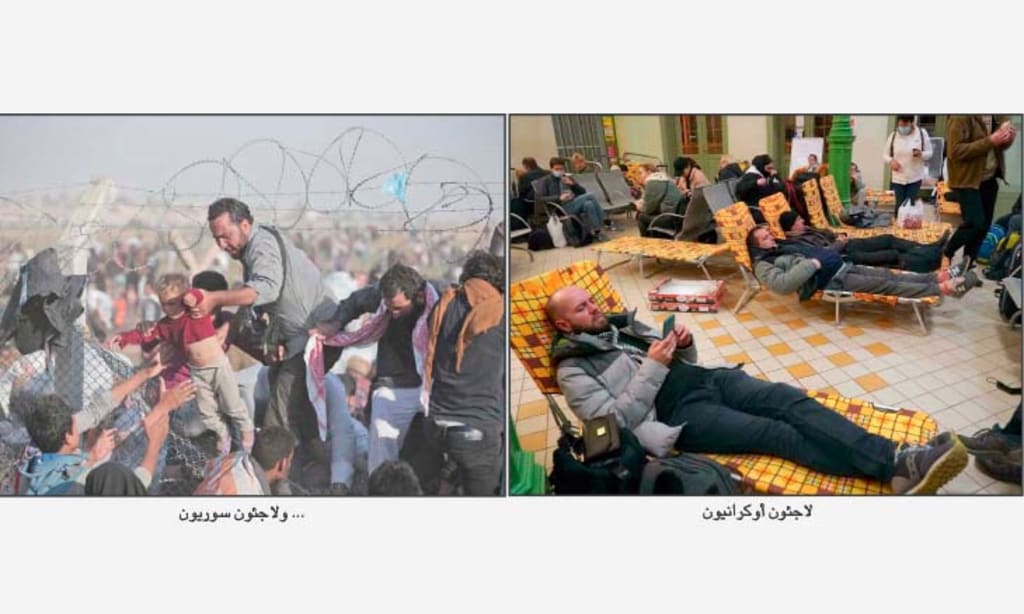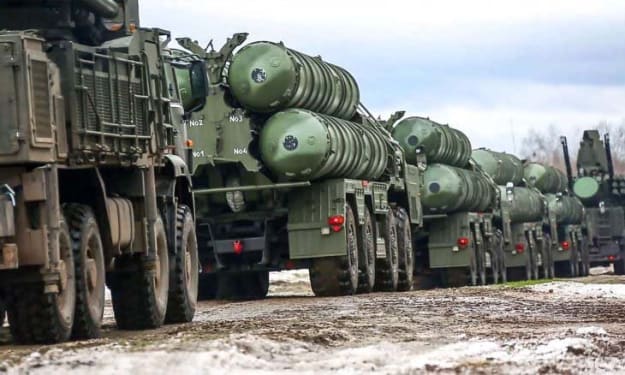Our refugees and Ukrainian refugees... Let's flip the tables!
The world has captured images of the beautiful sympathy received by Ukrainian families who have fled to Europe since the start of the Russian invasion of Ukraine three weeks ago.

The world has captured images of the beautiful sympathy received by Ukrainian families who have fled to Europe since the start of the Russian invasion of Ukraine three weeks ago.
Sympathy prevailed in the neighboring countries and in all of Europe. The moral and material welcome, official and popular, was strong, arousing admiration and respect. The European media has invested in this positive aspect to market the solidarity gift in its best form and to show European societies and their political and civil leaders at their highest levels of humanity. Social media platforms have done the rest of the job successfully.
It is difficult for the human mind not to stop at an imposing comparison between the treatment that the refugees of Ukraine received, and that which was awaiting the Arab, Muslim and African refugees who came to Europe in the past two decades, fleeing also from wars and conflicts sometimes more dangerous than what is happening in Ukraine today.
If one wants to be realistic, nothing is surprising: the rejection of our “refugees” is to be expected, and the welcome by the Ukrainians is also to be expected. Whoever expects otherwise needs to review some postulates.
This does not mean at all that what happened was right. It is only important to understand it so that our traumas are not repeated in the future, because the next is worse for “us”.
Our “refugees” were treated in this inappropriate way because they are strangers to the scene, and their presence in it constitutes a heavy burden on European societies.
The Ukrainian refugees were treated in this humane and elegant way because they fit the communities to which they were displaced, and did not impose any burden on them.
The burden posed by our “refugees” is not limited to the material, financial and service aspects, but extends, and this is the most important, to what is cultural, social and religious, with far-reaching repercussions on European society.
The Arab refugee, and the Muslim in general, arrives in the West laden with mountains of desires, internal contradictions and anxieties. And when he finds it difficult to get rid of it, he begins to work to bring it down, and sometimes impose it, on the new society.
By contrast, the Ukrainian refugee (and before him millions of immigrants from Eastern Europe) arrives freed from all spiritual, cultural and social burdens. He does not raise a problem of integration, he does not argue about issues that are at the heart of the society that opened the doors to him, and he does not demand special food and different clothing for his children in schools.
These details make a difference more than the financial burdens behind which governments hide in justifying their toughness towards our “refugees”.
The feelings of injustice, injustice and inferiority complex that have emerged during the past days in the Arab and eastern societies exporting refugees, are understandable in view of the extent of the intended discrimination that targeted people only because of their different appearance and cultural heritage, even though they have tasted calamities and deserve protection, and despite the fact that human values are one and indivisible (or so presumed) and injustice is rejected regardless of its location, its perpetrator and its victim.
But (large) it is necessary to realize that the world, on the sidelines of tumultuous wars, is experiencing a civilized and religious conflict between East and West, massive waves of refugees and integration problems is one of its symptoms. Just as our societies live in great fear of the future, Western societies live in similar fear of the “other” who came “from afar to threaten our way of living and thinking.”
These thoughts and fears are no longer taboo as they were a few decades ago. It is now infiltrated and adopted by political and cultural elites and making them electoral programmes. Otherwise, the French extreme right (to name a few) would not have reached the second round more than once in the presidential elections. We need to realize that right-wing movements in Western societies have become a part of people's lives. They watch them daily on television and read about them and about them without any disturbance.
We need to acknowledge that refugees from the East bear a share of the responsibility for nurturing hatred in their new societies.
When we realize these facts, the comparison between “our refugees” and “their refugees” becomes unobtrusive to us, and we stop feeling pain at some Western politicians and media praising “educated and understanding” Ukrainian refugees and “blonde Europeans” who “flee in beautiful cars like ours.” etc.
When we reach this reconciliation with the bitter reality, it becomes harmful for one of us to wish that Ukrainian refugees would be treated as Arabs, Africans and Afghans were treated, because this would be a departure from normal human instinct and an entry into the Arab (joke) logic that when the electricity goes out in the building, he looks out the window If he saw darkness engulfing the city, he felt happy and said: Praise be to God, it has gone to everyone!
Understanding reality gives us the courage to confront ourselves and ask questions that deserve to be asked, such as: What if we reversed roles and our societies were the recipients of refugees? Would she have opened her arms to blond Christian Europeans? The desire to answer leads to other, more painful questions: Did Lebanon receive Syrian refugees with flowers? Why are Morocco and Algeria about to fall into a diplomatic crisis because of 50 Syrian refugees? Does any of you know a Saudi family that opened the doors of their house to a Yemeni family? Can anyone point me to one Arab country that received a regular batch of 40 (not 4,000) Syrian or Afghani refugees? Would Tunisian society have been satisfied with the Libyans had it not been for their money and their coming for medical treatment and transit? Has anyone asked why African refugees choose the sea basin and die in its depths over staying in Libya, for example, or Morocco?
I know that Arab societies are already exhausted and their economic conditions are difficult, but this does not justify everything, nor does it justify abhorrent racist behavior and words that are sometimes seen at the doors of places of worship. I am not afraid to say that our societies would have acted in the same way towards the 'other', even if they were rich. The issue is greater than destitution and economic suffering, and poverty is sometimes a reason for man to restore his humanity.





Comments
There are no comments for this story
Be the first to respond and start the conversation.